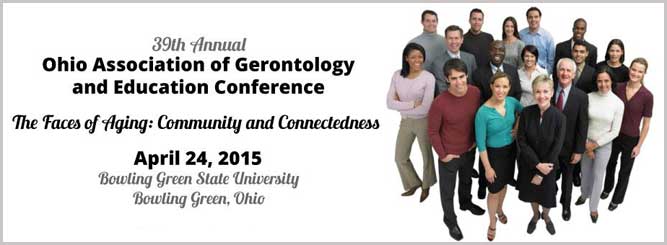Posters
Gerontology Social Workers’ Careers in their Later Years
Location
BTSU Ballroom
Start Date
24-4-2015 10:30 AM
End Date
24-4-2015 11:15 AM
Description
Purpose statement (objectives)
The purpose of this presentation is to raise awareness among gerontology educators of how to incorporate and effectively utilize retired practitioners who have previously worked with older adults. It will be organized around results from a recently conducted qualitative study of gerontological social workers who were transitioning into retirement from lengthy careers in gerontological practice.
Descriptive narrative of the presentation (Poster)
The presentation is based on findings from in-depth interviews with two retired and four employed social workers who had been employed for more than 20 years at agencies on aging. Grounded theory approaches guided the interviews and the coding and analysis of data.
Results revealed first, that participants nearing or at retirement wanted to continue working with older persons but in a less demanding manner than they previously had. Secondly, most participants, including macro social workers, preferred working directly with older adults. Lastly, participants relied on interaction with colleagues rather than educational seminars or workshops to remain up-to-date.
Although the increasing number of aging baby boomers has called attention to the growing need for gerontology social workers we still lack adequate number of students preparing for these careers. One way to meet this growing need is to re-employ retired gerontology practitioners who wish to continue working, either part-time or as a volunteer. Agencies on aging should consider innovative recruitment efforts with these older retirees who remain an important untapped resource that can effectively and easily fill the void of well-trained gerontology practitioners that we will need. Gerontology educators need to engage in greater outreach with these skilled workers and provide them with more networking activities. At the same time, such efforts will concomitantly help these retirees remain active and involved in meaningful work.
Gerontology Social Workers’ Careers in their Later Years
BTSU Ballroom
Purpose statement (objectives)
The purpose of this presentation is to raise awareness among gerontology educators of how to incorporate and effectively utilize retired practitioners who have previously worked with older adults. It will be organized around results from a recently conducted qualitative study of gerontological social workers who were transitioning into retirement from lengthy careers in gerontological practice.
Descriptive narrative of the presentation (Poster)
The presentation is based on findings from in-depth interviews with two retired and four employed social workers who had been employed for more than 20 years at agencies on aging. Grounded theory approaches guided the interviews and the coding and analysis of data.
Results revealed first, that participants nearing or at retirement wanted to continue working with older persons but in a less demanding manner than they previously had. Secondly, most participants, including macro social workers, preferred working directly with older adults. Lastly, participants relied on interaction with colleagues rather than educational seminars or workshops to remain up-to-date.
Although the increasing number of aging baby boomers has called attention to the growing need for gerontology social workers we still lack adequate number of students preparing for these careers. One way to meet this growing need is to re-employ retired gerontology practitioners who wish to continue working, either part-time or as a volunteer. Agencies on aging should consider innovative recruitment efforts with these older retirees who remain an important untapped resource that can effectively and easily fill the void of well-trained gerontology practitioners that we will need. Gerontology educators need to engage in greater outreach with these skilled workers and provide them with more networking activities. At the same time, such efforts will concomitantly help these retirees remain active and involved in meaningful work.


